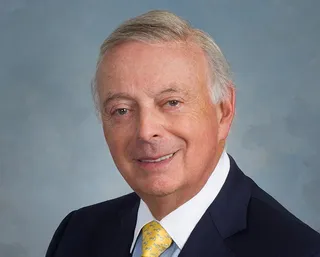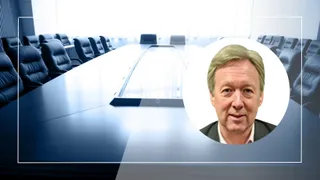
Energised by change
Industry veteran Don Kramer is looking a trifle forlorn. He should be fizzing with excitement; after all, his insurance-linked securities (ILS) firm is booming and he is in London to officially open a new office that is expected to drum up even more business through its close proximity to Lloyd’s and the wider London Market.
It transpires that Kramer’s wife’s niece is embroiled in one of the most controversial events ever to hit the usually tranquil fairways of women’s golf. That professional golfer is Suzann Pettersen, a member of the Ladies European tour. Following an incident during the Solheim Cup in September, she was castigated in the press for failing to concede a putt during a match against one of her US opponents. Although it was more a matter of etiquette than anything else, the backlash was quite something and Pettersen apologised profusely for what happened.
Kramer feels for her. He thinks she made a mistake made in the heat of battle that was born of a desire to do what was best for the team. This empathetic approach is typical of the man who devotes a lot of his spare time to charitable causes, not least his alma mater, Brooklyn College in New York City, where he has been a trustee of the college foundation for more than three decades.
Yet it would be incorrect not to assume that a rod of steel replaces his backbone when it comes to business matters. How else could you account for the many successful operations he has built over the years, including Bermuda reinsurer Tempest Re, which morphed into ACE Tempest Re, and Ariel Re?
Currently he is the chairman and principal owner of ILS Capital Management. But Kramer’s career path in reinsurance has not always been one smooth ride. In 1973 he started what may have been the first Bermuda-based ‘hedge fund’ reinsurer: Oppenheimer Re, a subsidiary of Oppenheimer & Co, the very successful manager of Oppenheimer Fund.
The company gave its pen to a reinsurance broker who loaded it with terrible business. Within 16 months Kramer and his partners closed the company. As a man with one business failure under his belt he can empathise with what his wife’s niece is going through, but also have the wisdom to understand that adversity can make you stronger.
Posted on the wall of his Bermuda office is the last stock certificate of Oppenheimer Re. He recalls with some seriousness the fact that his 1974 experience earned him a “Doctorate in Failure” noting “you learn so much more from your mistakes than you ever learn from the good things you do”.
Embracing a new dawn
All Kramer’s energies today are concentrated in the alternative capital sphere with his booming ILS Capital firm. Launched in July 2011, it harnesses long-term market relationships with underwriting expertise utilising state-of-the-art analytics.
The firm started small but performance has been positive. “We are one of the small players but our performance has been good—we hope to come out with double-digit returns this year,” he says.
“I want volatility, I want high-risk business because that is where I get my return. Hedge funds want low-risk business."
That will not better last year’s performance—a remarkable 19 percent—and it may include losses from August’s China port of Tianjin explosion and the Pemex event, in which four oil rig workers were killed and 16 injured when a fire broke out on the state-run oil production platform in the Gulf of Mexico in April.
“China could be a property loss more than a marine loss, so we don’t see any real exposure for us. With Pemex we put up a reserve based on a forecast of a $900 million loss for the whole event. That’s not significant for us.”
Asked if he has any doubts about the risks the company is exposed to in light of these claims, Kramer replies “We expect loss events, but the diversification of our portfolio and the limits we write for each risk make the difference in maintaining our overall return.
“Yes, we are writing cat, but we now also specialise in marine, aviation and excess weather,” he says and is not ruling out writing other books of business in various geographical locations in the future.
“Today the primary insurance industry is experiencing extraordinarily low interest rates as well as low prices for reinsurance,” he says. “The low interest rate environment is also driving traditional investment organisations to put more money into alternative assets. In the aggregate this leads to a soft market.”
Many high-net-worth individuals, private equity investment and pension fund managers and increasingly, charities and trusts, are struggling to meet their income mandates in this historically low interest rate era.
Kramer and ILS Capital think they can help. “Several of the big things that are making us look more interesting and attractive are: one, the volatility of the equity market—suddenly we have been given a lesson (in market volatility), but the equity markets have always been volatile.
“Second, consolidation in the industry is beneficial for us. If two companies merge, like Catlin and XL, and they are both on the same treaty, then the reinsured client is going to cut back—he doesn’t want a single party to have 50 percent of his business, he prefers that they represent 10 or 20 percent tops.
“That’s where we come in as a counterparty—so consolidation has helped small companies like ourselves tremendously.
“The third thing is that we write our reinsurance business principally on a collateralised basis so there’s no default risk. They don’t have to worry about the rating agencies pulling a rating down because being collateralised means that they are fully secured.”
Crossing the pond
Does the opening of a new London office signal a drive for further growth at a time when the investment stars are aligned? To a degree: “I don’t want to get too big—I want to be able to cherry-pick the market. That’s why we went into things such as marine aviation and weather. London is where the market is for a lot of this specialty stuff,” Kramer explains.
Is the decision to operate out of London a slight to Bermuda? “Not at all. Bermuda is holding up extremely well. There is consolidation and some companies have moved out. As that happens we lose the talent. But Bermuda has been fortunate in that the number of companies choosing to move down there has been enormous. They also had several hedge fund companies join the industry.”
The hedge fund reinsurers have, however, been struggling of late. Does Kramer feel the hedge fund model is under question?
“It’s not so much a failure of hedge funds; part of it was they were so successful that it really came off the top and they still sell at book value but it is less than a lot of people expected—again, because of the volatility of the equity markets.”
For ILS Capital it is a case of the more volatility, the better.
“I want volatility, I want high-risk business because that is where I get my return. Hedge funds want low-risk business so they can make the money managing the assets and their asset management side has failed to do it,” he says.
This brings us on to the question of mergers and acquisitions—is it a good thing for the reinsurance sector?
“We are going to see a lot of people laid off and a lot of business concentrating so I am not 100 percent sure that it is a good thing for the industry per se,” says Kramer.
“We are getting bigger and stronger companies and there are markets we haven’t penetrated yet—we haven’t gone into Asia to any degree and I know that Singapore would love to have more business. China is another place that’s opening up.”
It is the niche business such as weather-related risks that currently floats his boat. He says he is comfortable with the risks, and uncertainties, involved even in the context of potential climate change.
“We look at the analytics of what we write and then we determine what risk we have. We follow it and watch,” he explains.
The nature of Kramer’s chosen market means he needs to write this kind of risk in order to get the returns investors crave.
“Our average return is double digits but we will have one year, maybe two years, out of 15 when that won’t be the case and our return will go down.”
Cherry-picking risks
A lack of correlation on the book means that ILS “can sustain losses and still generate returns” and it is the job of ILS Capital’s bespoke Resolution system to make sure this remains the case.
“Resolution is a portfolio management system to make sure that we don’t cross over—become too correlated in one sector/location. It’s portfolio analytics as well as risk analytics and that’s why being small allows us to cherry-pick and to go into some speciality markets,” Kramer explains.
There are areas he won’t enter right now, including cyber—at least not in the foreseeable future.
“We need more data and it’s going to take some time but there is no doubt that it’s an emerging market.” And, he says, there is “no question” that reinsurers and captives will be at the forefront of managing this risk.
Meantime he is happy to play in the alternative assets space, where he sees tremendous growth potential.
“The investment community is multiple trillions of dollars, the reinsurance industry is $360 billion or something, so yes, there’s plenty of room for growth. The equity market is now as volatile as the cat market and investors are seeing that.”
Kramer seems to be rowing back somewhat on his predictions for the size he would like to take the company to. Two years ago he told Bermuda:Re+ILS that he would like to see assets under management at around the $4 billion mark. Now he’s saying that something like £2 billion is enough.
“Some of my guys would like it to go bigger but I don’t want to have to play the whole market. We want to make sure that we generate the returns—that’s what is important to me,” he says.
That is not to say that he is content with his lot. “I’m working on a bunch of things and we will see what comes out,” he says. When was he ever doing anything else?

